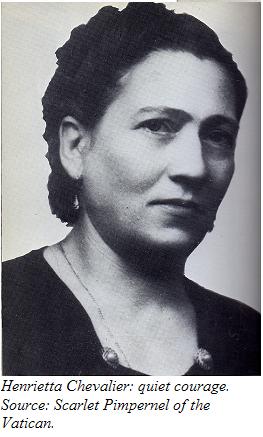Monsignor Hugh O'Flaherty

A Heroic Lady.
One of the organization’s first and best-loved collaborators was woman named Henrietta Chevalier. The Chevaliers were originally from Malta, a tiny British-owned island in the Mediterranean. Mrs. Chevalier was a widow. Her oldest son, being officially a British subject, had been put in prison at the beginning of the war. Her second son was staying at the Swiss Legation. Mrs. Chevalier and her six daughters lived on a small pension in a third-floor apartment on the Via Dell’ Impero. When a couple of escapers needed an emergency hiding-place one day, a priest mentioned Mrs. Chevalier to O’Flaherty – only as a temporary solution, of course. Private citizens would be executed if caught sheltering refugees.But the five-foot-four Mrs. Chevalier was not easily frightened. She took in those two refugees, and would host escaped soldiers throughout the war, sometimes as many as nine at a time in her six-room apartment. If the accommodations were lacking in space, Mrs. Chevalier’s cooking more than compensated. Her daughters, ages twenty-one to nine, thought the whole thing was great fun.
Not that there wasn’t danger. SS troops would conduct surprise raids of suspected properties. Several times, sympathetic neighbors warned the Chevaliers to send their soldiers out for a long walk and tidy away the extra mattresses and plates. Soon, rifle butts would crash against the door, troopers would march in, and the apartment would be thoroughly searched. Mrs. Chevalier would act calm. On one occasion she sat darning the escapers’ socks.
Casting Bread on the Waters.
The organization was getting the hang of things now. Refugees would make their way to the Vatican or be referred there by sympathetic Italians. O’Flaherty and May would find places for them in monasteries, hotels, or warehouses, and in private homes like Mrs. Chevalier’s, under the care of friendly Italian padrones, or patrons. When more space was needed, O’Flaherty began to rent properties of his own – such as the luxury apartment on the Via Firenze, right behind SS headquarters! Food and supplies were found by May. A circle of priests would deliver the supplies to the various billets every day, and bring warnings if it were necessary to vacate the premises. In the middle of it all was O’Flaherty, striding about in the distinctive wide-brimmed hat and red-and-black cassock of a monsignor – usually wiht a blatent disregard for the Nazis’ curfew.O’Flaherty also routinely ignored the distinctions that usually get drawn between different groups and nationalities during wartime. He would honestly help anyone who needed it. An old granary on Vatican grounds once held a typical mix of refugees: fifteen American civilians, one American GI, two American airmen, eight British soldiers, one Irish Guardsman, several political fugitives, a Protestant clergyman from South Africa, and an Italian pilot who’d had to disappear because he’d flown Italian top brass to the surrender meeting. Communists from Yugoslavia showed up at the Vatican’s gates. So did Arabs who had been captured during Italy’s campaign in North Africa. O’Flaherty did what he could for them all.
It took a lot to make the monsignor choose sides. At the beginning of the war, O’Flaherty, with his childhood memory of British oppression, was often heard to say that he saw no real difference between the British and the Germans. It was only after he saw Roman Jews being rounded up by the SS that O’Flaherty really came down on the side of the Allies. And the man who’d been so anti-British as a youth ended up rescuing more British POWs in Italy than anyone else.